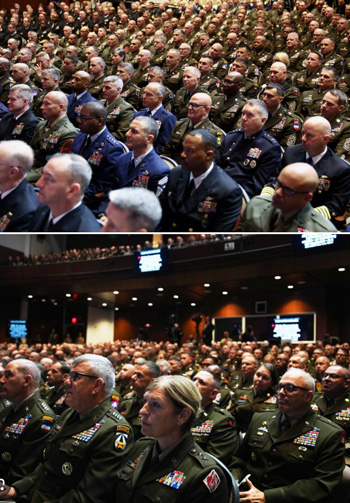Social-Political Issues
 |
 |
 |
 |
 |
 |
 |
Discipline Is Back in the U.S. Armed Forces
- President Trump’s speech at Marine Corps Base Quantico in late September signaled a dramatic shift in U.S. military leadership, demanding loyalty and dismissing dissenters – over 15 senior officers have already been purged for disagreement.
- Trump aims to align the military with his “America First” doctrine, prioritizing domestic deployment against crime and civil unrest, potentially blurring lines between law enforcement and warfare.
- Draft defense plans suggest closing overseas bases and redeploying troops domestically, framing urban violence and illegal immigration as existential threats – testing legal limits like the Posse Comitatus Act.
- The administration’s skepticism of NATO and foreign entanglements (“Let Europe defend itself”) risks emboldening adversaries like Russia and China, while supporters dismiss concerns as overstated.
- Critics warn of politicizing the military, comparing Trump’s rhetoric to pre-war authoritarian regimes, while his base sees it as necessary accountability in a “fight for survival.”
Flanked by Defense Secretary Pete Hegseth, Trump demanded loyalty, ridiculed what he called the “feminization” of the armed forces and warned that dissenters would be stripped of rank. In line with this purge, the chief executive urged the dismissal of “men in dresses” and “fat generals.”

Nearly 900 high ranking commanders present at the September 30, 2025 Quantico Base meeting
Brighteon.AI‘s Enoch points out that the remarks underscored Trump’s frustration with the Pentagon’s resistance during his first term. At the time, generals like retired Army Gen. Mark Milley openly defied him – even secretly reassuring China that Trump’s more aggressive postures would not be enacted.
Since January, at least 15 senior officers have been dismissed for public disagreement, a purge Trump frames as necessary to restore discipline. According to critics, his choice of Hegseth – a Fox News personality with no prior military leadership experience – reflects a preference for loyalty over institutional knowledge. They warn that the approach risks politicizing the armed forces, but Trump’s base sees it as overdue accountability.
A military turned inward
The most startling revelation was Trump’s suggestion that U.S. cities like Chicago could become “training grounds” for the military, framing crime as a battlefield. This aligns with his broader “America First” doctrine – pulling troops from Europe and the Middle East while prioritizing homeland security. Draft defense plans reportedly call for shuttering overseas bases and redeploying forces domestically, potentially blurring the line between law enforcement and warfare.
Historically, such moves have been constrained by the Posse Comitatus Act, which limits military involvement in civilian affairs. But Trump’s rhetoric suggests a willingness to test those boundaries, framing urban violence and illegal immigration as existential threats requiring martial solutions.
“The fight to save this country isn’t just overseas,” he declared. “It’s right here.”
If Trump succeeds in reorienting the military inward, the geopolitical implications could be profound. Russia, China and other adversaries have long operated under the assumption of U.S. global hegemony. A retreat from NATO or the Indo-Pacific could embolden rivals – a scenario some Trump allies dismiss as overstated.
“Let Europe defend itself,” Hegseth has argued, echoing the administration’s skepticism of foreign entanglements.
Yet the risks of domestic militarization are equally stark. Comparisons to pre-war authoritarian regimes are inevitable, though Trump’s supporters reject such analogies. “This isn’t about tyranny,” said one attendee at Quantico, speaking anonymously. “It’s about survival.”
Trump’s Quantico speech was more than a rallying cry – it was a blueprint for transforming the U.S. military into an instrument of his political vision. Whether this shift represents a necessary correction or a dangerous politicization depends largely on perspective.
But one reality is undeniable: The world’s most powerful army is no longer content to police distant conflicts. Its next battle may be at home, and the generals who resist may find themselves casualties of Trump’s war on dissent.
Read other articles by Belle Carter here
Posted October 15, 2025

______________________
______________________
 Volume I |
 Volume II |
 Volume III |
 Volume IV |
 Volume V |
 Volume VI |
 Volume VII |
 Volume VIII |
 Volume IX |
 Volume X |
 Volume XI |
 Special Edition |


